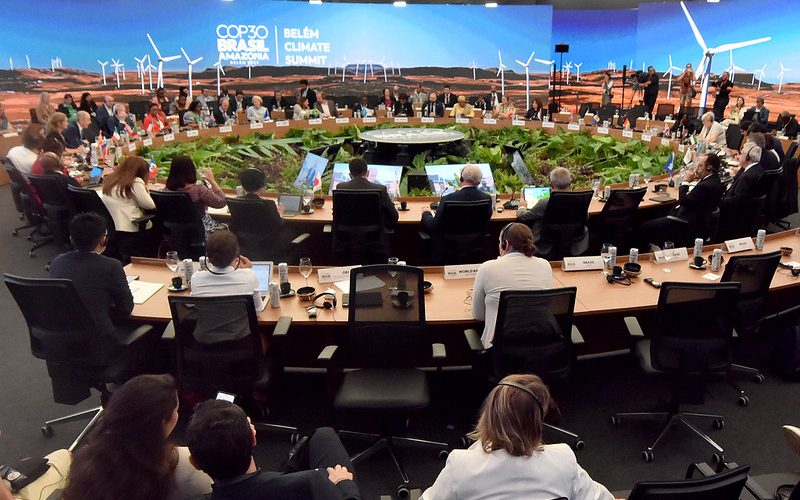The 30th United Nations Climate Change Conference (COP30) is all set to open on Monday in the Amazonian city of Belém, with governments under growing pressure to turn decades of pledges into concrete action amid record global temperatures.
The two-week summit, held at the edge of the world’s largest tropical rainforest, comes as scientists warn that the planet is on track to temporarily exceed the 1.5°C temperature limit set by the 2015 Paris Agreement. The Amazon’s role as a crucial carbon sink has made the location symbolic of both the scale of the challenge and the urgency of global cooperation.
Speaking at the Plenary of Leaders of the Belém Climate Summit, United Nations Secretary-General António Guterres said the time for negotiation had passed. “It’s no longer time for negotiations. It’s time for implementation, implementation and implementation,” he said.
Under Brazil’s presidency, COP30 will centre on an “action agenda” of 30 key goals supported by specialised working groups, known as “activation groups”. The initiative, referred to as a mutirão — a Portuguese term for “collective task” — highlights Brazil’s emphasis on Indigenous leadership and local participation in the global response to climate change.
Climate finance and the $1.3 trillion target
One of the main items on the agenda is securing finance for developing nations to support emission reduction and adaptation efforts. Delegates will discuss the Baku-to-Belém Roadmap Report for $1.3 Trillion, prepared jointly by the COP29 and COP30 presidencies.
The report identifies five priority areas for mobilising funds, including increasing support for multilateral climate finance institutions, introducing levies on polluting activities, and converting sovereign debt into climate investments. It also calls for the removal of legal clauses that allow corporations to challenge governments’ environmental policies, which have cost states an estimated US$83 billion in litigation.
Without substantial increases in funding, scientists warn global temperatures could rise by between 2.3°C and 2.8°C by the end of the century, increasing the risk of severe droughts, flooding and heatwaves.
National climate plans under review
COP30 will also review countries’ Nationally Determined Contributions (NDCs), which outline national strategies for cutting greenhouse gas emissions. Current pledges would achieve only a 10% reduction by 2030, far short of the 60% cut needed to keep global warming below 1.5°C.
By the end of September, only 64 of the 196 signatories to the Paris Agreement had submitted updated NDCs. Delegates are expected to call for stronger targets and more transparent reporting mechanisms.
In addition, negotiators are due to approve 100 global indicators to measure progress on climate adaptation. According to the UN Environment Programme, while 172 countries have at least one adaptation policy, many are outdated. UNEP estimates that adaptation finance must rise twelvefold by 2035 to meet developing countries’ needs.
Just transition and global cooperation
Another key focus will be advancing the Just Transition Work Programme, which seeks to ensure that efforts to decarbonise economies do not exacerbate social inequality. Civil society organisations are urging the creation of a “Belém Action Mechanism” to coordinate just transition initiatives and expand access to clean technology and financial support for vulnerable nations.
Historical context
The Conference of the Parties (COP) remains the world’s principal decision-making body on climate policy under the UN Framework Convention on Climate Change. Over the past three decades, it has produced landmark agreements, including the Kyoto Protocol and the Paris Agreement.
At COP28 in Dubai, countries agreed to transition away from fossil fuels and triple renewable energy capacity by 2030. COP29 in Baku raised the annual climate finance target for developing nations from US$100 billion to US$300 billion, with a long-term goal of US$1.3 trillion per year.
Call for urgency
In a statement issued ahead of the conference, UN Climate Change Executive Secretary Simon Stiell said: “The Paris Agreement is delivering real progress, but we must accelerate in the Amazon. COP30 must send a clear signal that nations are committed to climate cooperation, accelerate implementation across all sectors, and link climate action to tangible benefits such as jobs, cleaner air and affordable energy.”
COP30 will run from 10 to 21 November in Belém, with world leaders, negotiators and civil society representatives expected to finalise agreements on finance, adaptation, and implementation of the Paris goals.
















